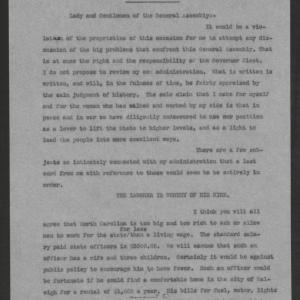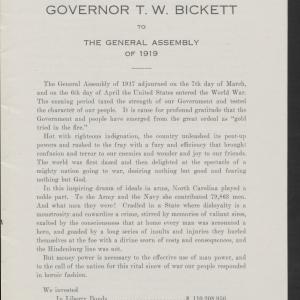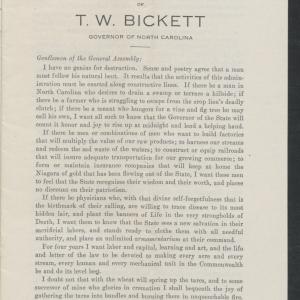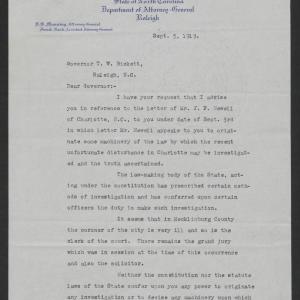- Transcription
J. FRANKLIN FLOWERS
ATTORNEY AT LAW
CHARLOTTE, N.C.
February 14th, 1920.
Hon. T. W. Bickett,
Governor of North Carolina,
Raleigh, North Carolina.
Dear sir:-
RANLO EJECTMENTS- AND STRIKE.
Having noticed from the press dispatches that you are considering the matter of taking this situation in hand, and having appeard as attorney for these defendants in the ejectment proceedings before the justice of the peace, I am writing you regarding the matter, so that the position of myself, as well as the attorney for the employees may be before you.
The justice of the peace having decided in favor of the plaintiff, the mill, there was nothing left to do but to appeal and undertake to make bond, but it was decided not to make the bonds, this decision, however, was made without my advice or consent, and as a matter of fact I have not been called in on the matter since the trial except to be consulted by some individuals interested, and then Mr. Love, manager of the mill telephoned me on Tuesday night, and twice Wednesday morning, requesting that I come over and see what I could do towards getting the matter settled.
I had previously talked to Mr. Love regarding a settlement of the differences, and was hopeful that some agreeable disposition of the matter might be had, but heard nothing more from him until he telephoned to me as stated above. I understand that he was to advise me as soon as his Superintendent was able to be out, so that we could arrange a conference at which the differences might be discussed, and knowing my position and attitude as he did this offer of his, made to me on the day of the hearing on the ejectments, caused me to hope that a settlement was within the realm of reasonable probability, and I felt rather hopeful of the situation, until he telephoned me asking me to come over, and after I got in touch with representatives of the United Textile Workers of America here in Charlotte who are in charge of the matter, by whom I was advised that the demands of the employees could not be withdrawn. My idea was to get them to withdraw their demands and start with a clean slate and free and frank discussion of the matters indifference with the hope of finding a fair and satisfactory solution of the differences, but this appeared unsatisfactory at the time.
I was so anxious to get the matter adjusted with as little suffering and economic loss as possible, that I may have acted unwisely in writing to Mr. Love as I did on February 10th, copy of which letter I am enclosing herewith.
I have known Mr. Love since I was a small boy, and know him to be one of the best ment in the state, and Mr. John C. Rankin, president of the mill, is one of the best friends I have ever had, and I think that he is displeased with me for my position in the matter, although he should certainly see that, while my sympathies are with the employees, I did nothing unfair or extreme in my efforts to safeguard their rights. I have been of the opinion that Mr. Love, if left free to exercise his own judgment and inclinations in the matter, and I for the employees, could settle this matter in a little while, but Mr. Rankin is unwilling to listen to any compromise, and is very pronounced in his opinions and convictions, and I am afraid he is now too old to change either, and it looks like a deadlock, unless you are willing to throw your influence into the situation and straighten it out.
My personal opinion is that you can get a settlement, for I believe that your intervention would carry with it such power and influence that the two contending forces would come together in an honest effort to work out a just and equitable settlement.
Personally I believe that to recognize the Union would result in benefit to the mill, and cannot, for the life of me see why they should refuse to recognize it in the manner in which they are requested to recognize it in this case.
I do not know that it is desirable that the employees be represented in any hearing that you may hold in the matter, but under the circumstances I felt that I shoulwrite this letter, so that if you think that I could be of any service, I would be happy to do what I can, and as I am expecting to be in Baltimore on next Tuesday attending court there, I would be glad to have you telegraph me on Monday if you think that it would be wise for me, or someone else to be present, in addition to the officers of the employees themselves.
If you have decided when you will likely take the case up, if at all, and would kindly advise me when you will do so, I should be very much obliged, so that if I could not be here, I could advise them to that extent and if they desired, and you desired that they be represented, then they could make such arrangements as they might think best.
Yours very truly,
JFFc






